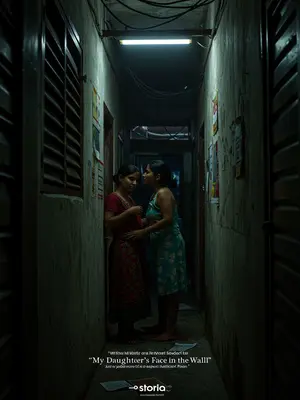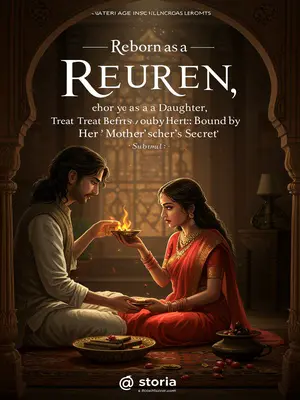Chapter 5: Rituals and Sacrifices
On the eve of Eldest Sister’s entry into the palace, Father took the legitimate branch of the Kapoor family to the ancestral hall, to inform the ancestors and heaven and earth. By flickering diya light, the relationship between father and daughter was now that of ruler and subject. Father held a silver tray, kneeling with three prostrations and nine bows, not a trace of carelessness.
The scent of incense mingled with the sharp smell of burning ghee. The whole family gathered in silence, shadows dancing on the ancestral portraits, the air thick with unsaid prayers.
Eldest Sister rushed to help him, but Father said in a low voice, "Rituals must not be neglected." This kneeling was to the majesty of the presidential family, and also to make her understand—from this day forth, kinship must yield to power.
His words carried the weight of history. Even the youngest among us, who still sucked her thumb, seemed to understand that something irrevocable was happening.
As the hour of the tiger approached, Mother personally dressed Eldest Sister. Ten lakh rupees were divided into twelve envelopes, the largest hidden in her potli, silver coins sewn into the corners of her maid’s handkerchief. Father presented a sandalwood box containing a piece of pure gold, carved into a seal. "There are eighty-six secret posts in the palace; from now on, they will all obey your command."
Mother’s hands moved swiftly, tucking notes and jewellery into hidden folds. I noticed her eyes glisten for a moment, but she did not let her tears fall. The preparations were as meticulous as those for a bride, yet heavy with the knowledge that this was a different kind of departure. Before she left, Mother adjusted her bindi, whispered a prayer under her breath, and tucked a tiny sachet of tulsi into Eldest Sister’s potli for protection.
Eldest Brother offered a visiting card. "This woman is skilled in women’s ailments, already registered at the Presidential Clinic."
He spoke with the gravity of a doctor pronouncing a prescription, his pride in his sister hidden behind his careful words.
Second Brother handed over a deed. "The three busiest streets in Lucknow—these are for your use."
His voice was steady, but his hand shook as he handed over the deed. The weight of the family’s fortunes now rested in her hands.
Third Sister and I, not yet of age, prepared personal gold pendants and sachets, the gold warm to the touch, the sachets sewn with precious calming herbs.
We stitched them late into the night, pricking our fingers and whispering prayers for her safety. The scent of chameli and tulsi clung to the tiny bags.
Second Sister was the last to step forward. She held a peacock shawl embroidered with gold thread, its feathers shimmering with seven colours in the candlelight, every stitch imbued with thought. Her hand lingered too long on the peacock shawl, betraying her inner turmoil. "My needlework is clumsy; I only hope Sister will wear this and soar like a peacock."
Her voice broke as she handed the shawl over, her usual bravado stripped away by the enormity of the moment.
As she spoke, a single tear fell upon the peacock’s eye. "I remember, when I was young and learning to embroider jasmine flowers, I could never get it right. Eldest Sister held my hand, teaching me stitch by stitch."
The memory softened her face, but the pain was unmistakable. For a moment, the rivalry between them seemed like something that belonged to another life.
Eldest Sister’s smiling lips froze. When she looked up again, seventy percent was the pain of being betrayed by kin; the remaining thirty percent was the memory of that Diwali, when Second Sister shielded her from hot oil, leaving a shallow scar on her arm.
It struck me then that love and betrayal could coexist so easily, like two sides of the same coin. Our home was full of such paradoxes.
The strife of the inner chambers always begins in silence, and ends without blood. At this moment, I finally understood: every golden thread on the peacock shawl was entwined with unspoken feelings—thirty percent calculation, seventy percent sincerity. Just as under the gulmohar trellis that year, she personally pushed Eldest Sister into the abyss, then hid behind the garden bench, weeping into her sleeve.
It is in such small gestures—the trembling hand, the tear that falls in secret—that the real drama of our lives unfolds. The politics of the home are as ruthless as any darbar.













